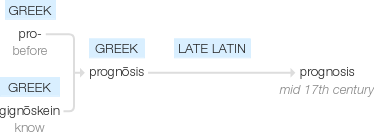Prognosis
mid 17th century: via late Latin from Greek prognōsis, from pro- ‘before’ + gignōskein ‘know’.
wiktionary
Borrowed from Latin prognōsis, from Ancient Greek πρόγνωσις(prógnōsis, “foreknowledge, perceiving beforehand, prediction”), from prefix προ-(pro-, “before”) + γνῶσις(gnôsis, “inquiry, investigation, knowing”), from γιγνώσκω(gignṓskō, “know”). First attested in the mid 17th century. Equivalent to Germanic cognate foreknowledge, Latinate cognate precognition, and Sanskritic cognate prajna.
etymonline
prognosis (n.)
1650s, "forecast of the probable course and termination of a case of a disease," from Late Latin prognosis, from Greek prognōsis "foreknowledge," also, in medicine, "predicted course of a disease," from stem of progignōskein "come to know beforehand," from pro- "before" (see pro-) + gignōskein "come to know" (from PIE root *gno- "to know").
An earlier form in the same sense was pronostike (early 15c.), from Medieval Latin pronosticum. The general (non-medical) sense of "a forecast of the course of events" in English is from 1706. A back-formed verb prognose is attested from 1837; the earlier verb was Middle English pronostiken (c. 1400), from Medieval Latin pronosticare. Related: Prognosed; prognosing.
